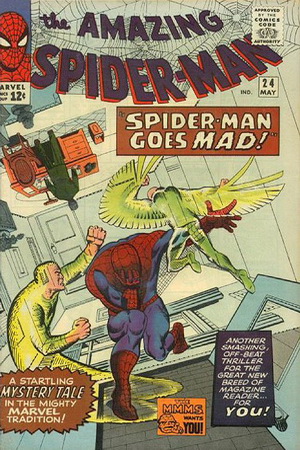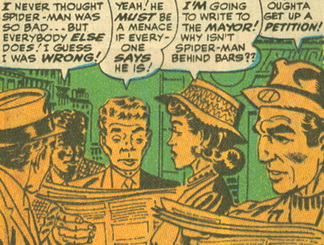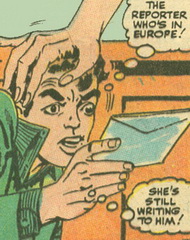
Published: May, 1965
Script: Stan Lee
Art: Steve Ditko
Letters: Sam Rosen
The narrator begins by promising that this tale will be “off-beat,” and right away, I’m on board. I’ve always had a propensity for “off-beat,” from childhood, when I played with trolls rather than Barbie Dolls, to my college days, when I listened to Frank Sinatra rather than ELO, through the 90’s when some of my favorite TV shows were the short-lived Key West, and the longer-lived Northern Exposure, right up to now, when, as a woman in my sixties, I’m reading Marvel Comics. So here I am, looking forward to some off-beat-ness in the latest issue of Amazing Spider-Man, but this story was off-beat in a way that was not completely comfortable, because by the time I finished reading, I realized that almost every character in the story was engaging in some form of gaslighting.
Four or five years ago, my experience with the concept of gaslighting was limited to the world of entertainment: Charlotte Bronte’s gothic novel Jane Eyre, that great Hitchcock film, Suspicion, and probably more plotlines than you can count in Dark Shadows. But if you’ve been paying any attention to politics lately, surely you’ve become acquainted with the concept. To clarify, Wikipedia puts it this way:
Gaslighting is a form of psychological manipulation in which a person or a group covertly sows seeds of doubt in a targeted individual or group, making them question their own memory, perception, or judgment.
Furthermore:
Using denial, misdirection, contradiction, and misinformation, gaslighting involves attempts to destabilize the victim and delegitimize the victim’s beliefs.
In other words, when you’re being told, “What you’re seeing and what you’re reading is not what’s happening,” that’s gaslighting. And in this story, an awful lot of what we’re seeing and hearing is not actually what’s happening.
 PERSUASION
PERSUASION
The action gets going when Dr. Ludwig Rinehart, “a famous European psychiatrist” (who is actually Mysterio), easily convinces J. Jonah Jameson that he has proof Spider-Man will soon suffer a severe psychological breakdown. Which Jameson immediately and gleefully publishes.
Jameson, of course, has a confirmation bias which pushes him in this direction, but the fact that this “expert” is “European” is not insignificant. I’ve noticed that a lot of television commercials nowadays, especially for cars, employ a British accent to make their persuasive point. Is there research showing that American people are more likely to believe someone with a British accent? Dr. Reinhart, of course, has a German accent. (We only see his written words on the page, but don’t tell me you aren’t reading them in a German accent!) No doubt this stereotype is part of what convinces Jameson he can sell this drivel to his readership.
When Peter picks up the Daily Bugle and reads the psychological evaluation by this “European expert,” the seeds of doubt are planted. Later, when he sees Spider-Man’s past villains appear then disappear, he’s convinced he is indeed cracking up.
As Spider-Man, he rushes to Rinehart’s home, where further unexplainable sights await him, and the “psychiatrist” easily goads him into believing that he needs help, “but first I must have your complete confidence!”

By employing deception, psychological manipulation, and the voice of authority, Mysterio convinces Spider-Man that the only way to keep from going completely mad is to reveal his true identity and give up being Spider-Man. Peter is just about to do that, when Jameson bursts in and mucks it all up.
SPIN & BEYOND
That’s a convenient plot point, but not what I’m here to talk about today. Today I’m talking about gaslighting, and along this theme, I’m going to bring up another term you may be aware of, if you’ve ever paid attention to the news, and that term is “spin.” Let’s go back to Wikipedia:
In public relations and politics, spin is a form of propaganda, achieved through knowingly providing a biased interpretation of an event or campaigning to influence public opinion about some organization or public figure.
You could say that “spin” is a milder form of gaslighting. Spin contains just enough truth that the perpetrator can stand back and say, “Hey! I’m kosher, get off my back!” while at the same time, being absolutely aware they are not telling the truth, the whole truth, and nothing but the truth.
 Having said all that, Jameson goes way beyond simple “spin.” His journalistic ethics are down the toilet. He consciously blurs the line between fact and opinion, moving beyond spin into outright falsehood. He deliberately uses the power of the press to mold public opinion against Spider-Man, regardless of the truth. When someone/anyone walks into his office purporting to be a “European expert” and spouting exactly what he wants to hear, Jameson makes no effort to vet the source, he just runs with the story. The Bugle is obviously a closer cousin to the National Enquirer than the New York Times.
Having said all that, Jameson goes way beyond simple “spin.” His journalistic ethics are down the toilet. He consciously blurs the line between fact and opinion, moving beyond spin into outright falsehood. He deliberately uses the power of the press to mold public opinion against Spider-Man, regardless of the truth. When someone/anyone walks into his office purporting to be a “European expert” and spouting exactly what he wants to hear, Jameson makes no effort to vet the source, he just runs with the story. The Bugle is obviously a closer cousin to the National Enquirer than the New York Times.
I’m surprised that Peter, smart as he is, doesn’t stop to consider that the story calling Spider-Man crazy is running in the newspaper operated by the man who has a personal vendetta against him. Knowing what he knows about Jameson, and for something this important, Peter  should be checking to see if this inflammatory rhetoric is backed up by any other reliable sources. Or is the Daily Bugle the only show in town?
should be checking to see if this inflammatory rhetoric is backed up by any other reliable sources. Or is the Daily Bugle the only show in town?
Why does Peter jump right on board with this crazy notion that he’s going crazy? Is it because he subconsciously feels it must be so? Is it because it’s the 1960’s and distrust of the media has not yet metastasized to the degree it has today? Back then, if a story was published or broadcast, the public automatically believed it was true. Is even whiz-kid Peter Parker falling into that trap? Or is it only because in a twenty-page story, Stan decided he didn’t have time to show our hero investigating his doubts about his doubts?
UNHEALTHY HERO WORSHIP
Here’s another game Stan is playing with us, and he’s doing it for humor, but from a 2021 perspective, it hardly seems humorous at all. It’s well-established that Flash is (ironically) Spider-Man’s biggest fan. In this story, he undertakes a spy mission for purely personal reasons, following Peter, whom he suspects is secretly meeting with Liz. But he suddenly aborts that mission, when he sees the spider beam and thinks his hero is nearby. Sigh…So much for Liz—now we know where Flash’s true loyalties lie!
And that’s all very cute, but not sinister. The part that disturbs me is that by the end of the story, Flash is ecstatic that Spider-Man spoke to him. And not just that he spoke to him, but that he is willing to live with this: “Even if he did call me a fool…he spoke to me!” Flash. Please. Have a little self-respect. Your hero worship is out of control. I’m one step away from saying Flash has drunk the Kool-Aid and is now deliberately gaslighting himself.
SELF-DESTRUCTION
Peter also “gaslights himself” when he allows seeds of doubt to spring up regarding Betty and Ned. He finds Betty’s letter to Ned and, as if he were a character in any episode of Three’s Company, assumes the worst.  The poor boy’s self-esteem is suffering terribly, and he is more than willing to twist it all around to believe the worst possible outcome for him personally.
The poor boy’s self-esteem is suffering terribly, and he is more than willing to twist it all around to believe the worst possible outcome for him personally.
Predicting the worst in a romantic relationship might be a way of gaslighting yourself for protection against future emotional distress, but something more sinister is going on in Peter’s troubled  teenage psyche. If he hadn’t been so gaslighted by Jameson and the “European expert,” if he had been able to think more clearly, he may have realized that when he started seeing all his past opponents, Mysterio was not one of them…and oh, by the way, what are Mysterio’s powers? To make you see and hear things that aren’t actually there! Peter could have used his scientific powers of deduction to at least suspect Mysterio could be behind all this.
teenage psyche. If he hadn’t been so gaslighted by Jameson and the “European expert,” if he had been able to think more clearly, he may have realized that when he started seeing all his past opponents, Mysterio was not one of them…and oh, by the way, what are Mysterio’s powers? To make you see and hear things that aren’t actually there! Peter could have used his scientific powers of deduction to at least suspect Mysterio could be behind all this.
But he was too far gone already.
OVERTHINKING?
Of course, Peter could have tempered these suspicions with the fact that Mysterio was in prison, but really…in the Marvel Universe, no super-villain remains in prison very long, right? That also should have entered into his deductions.
When Mysterio got out of prison, knowing Jameson, the headline surely read, “Super-Villain Mysterio, Previously ‘Captured’ by the Weak and Failing Spider-Man, Easily Escapes Prison,” and Peter, as a daily reader of the Bugle, would have noticed.
And if he didn’t, it’s only because I’m putting a lot more thought into these 12-cent stories than the creators ever did in 1965. But, in my defense, I say: look, Marvel writers of 1965, if you’re going to write a story that survives 56 years, and create characters  that will one day populate a multi-billion dollar entertainment empire, it’s not unreasonable to think that at some point in the future a 60-something year-old woman who once played with trolls while the boys in her class were reading comics, is now perusing and finding meaning in those very comics.
that will one day populate a multi-billion dollar entertainment empire, it’s not unreasonable to think that at some point in the future a 60-something year-old woman who once played with trolls while the boys in her class were reading comics, is now perusing and finding meaning in those very comics.
| Want to read this comic on your computer? Marvel has a scan! Want to own the story? Buy the Masterworks! |














